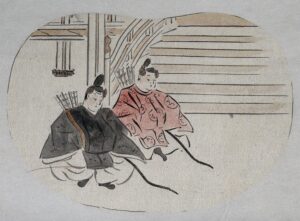Writing lessons come from lots of places. We steal from other disciplines constantly, using terms like “architecture” to talk about plots, or “fleshing out” to talk about giving more details in scenes. Some of those terms are so ingrained in our vocabulary that we seem to think of them as idiomatic rather than what they are: stolen.
Stephen King talks about that as adding to your writer’s toolbox, and he suggests it’s good to constantly add to your toolbox.
A particularly abundant vein of tools is the viewpoints of people who have been there before and found something new—“there” has a variable definition. Like Kurt Vonnegut’s “shapes of stories” talk where he demonstrates why Hamlet doesn’t have any plot. Or the observation Gene Wolfe made that you never learn how to write a novel—you only learn how to write this novel.
Wisdom, in short. Wisdom lying about all over the place. Leaking out the walls in some places.
I have a book called The Book of Five Rings by a sixteenth century samurai named Miyamoto Musashi. He was a fairly successful samurai, in that he survived over fifty duels and lived into his sixties, which are pretty significant numbers when your day job is made up of not dying when your entire country is currently built on a culture where rising through society is partly predicated on hunting out and testing out people like you. Musashi wrote The Book of Five Rings near the end of his life, while under siege in a cave, which was probably the first time he had the opportunity to sit still and write. (Relatable.)
The result is a brief text made of a lot of short essays that address thoughts about living a life devoted to a practice as they occurred to him. It’s the sort of book you flip through, engage with a passage, and think about it for a while, instead of reading it cover-to-cover.
And it’s also one of these examples of a deep thinker with a lot of experience working through how the mind and body work together. How does theory inform practice and vice versa? How do you maintain discipline? Those are some of the concerns of Bushido.
I find it a useful book. Writing is such an odd confluence of struggling to get your mind and body to work together on a regular basis to improve something that sometimes only you understand. I find that people like Musashi have helpful tools for my writer’s toolbox. Musashi, and people like him who have had a lot of experience working out how action and discipline and thinking work together, have a lesson or two for us writers.
I encourage you to find a copy of the book and browse through it. Here are a few passages and how they apply to the writer’s life. To Satado, or the Way of the Writer.
“Practice is the only way that you will ever come to understand what the Way of the warrior is about. Constant striving for perfection of the self through a chosen art is the only path to enlightenment.” — Miyamoto Musashi, The Book of Five Rings
Musashi wants us to put work into whatever field we are in. Practice means exactly what it sounds like: striving to improve. For a writer, this means writing, but not writing just whatever and however you like.
Constant striving for perfection admits that perfection itself isn’t necessarily what you expect to achieve, but that always aiming that way and then always working harder is that path in itself.
When Musashi next points out that “Words can only bring you to the foot of the path,” he is cautioning us against relying too much on theory. Unless you pursue your own practice, you won’t ever attain mastery.
“What is meant by the moon and the stars is that although both are in the sky they are two different things. The sky is the attack and the moon and the stars are the methods used.” — Miyamoto Musashi, Book of Five Rings: The Book of Fire

Musashi reminds us to be nimble. If the sky is comfortable holding millions of stars and an enormous, changeable, moving moon, then Musashi recommends we can be that way too.
Techniques take up no physical space. We can learn new methods. We can learn as many as we have the patience to figure out, in fact. Whole constellations of skills and varied approaches.
So we need to know a lot of techniques to come at every battle. We will always be tempted to rely on a few techniques we like, and they will serve us in many battles. But every now and then, there will be a fight that comes at us that has a trick or trap that wrong-foots us.
When that happens, we need to switch! Try a different technique, maybe one we’re not as used to using.
“In fighting it is always best to go straight in. Always go straight in, with utter resolve, regardless of the situation. You must not waver when you are making the attack.” — by Miyamoto Musashi, Book of Five Rings: The Book of Water
Musashi wrote an introductory essay for Book of Five Rings where he talked about his intentions. Book of Five Rings is as much a book about using a sword as it is about general strategy. That’s kind of cool, because it means there are long-term lessons in it, but there are also practical ones about taking the next action in the next five seconds of your life.
Like this one. When Musashi says “in fighting,” he means up close and personal. That said, the lesson applies to everyday life, because every task is like a fight in that it requires attention and faces opposition.
Musashi advises you to go straight in with utter resolve, regardless of the situation. And do not waver. If you know your goal, then hesitation will serve you no good. You must aim your “attack” at the center of your goal, and above all else don’t flinch. Flinching allows the “enemy” to get at you.
For a writer, your attack is your craft. Or your publishing goals. Or your marketing goals.
And the enemy you don’t want to flinch for is writer’s block, or missed opportunities, or any failure to achieve your success.
Go straight in, and don’t flinch.
“When you truly understand the Way, you can take any form that you want to. It is almost as if you had developed miraculous powers.” — Miyamoto Musashi, Book of Five Rings: The Book of Fire
An advantage of the writings of a teacher like Musashi is he is a goal-oriented thinker. He had to be. He couldn’t afford to just be a philosopher, because for better or worse he lived “by the sword.”
Musashi wants us to trust that his advice isn’t theoretical. It’s based on long, arduous experience. He wrote this book when he was at least sixty years old, and he wanted to pass along the value of practice.

A lot of us who are looking for wisdom are at some earlier stage in our development. We don’t have a life that has been tempered by constant attacks behind us to affirm our practice. We’re somewhere in the middle of life, doubting our next step.
No matter where we are on our path, we’re not certain about the end we’re walking towards. Musashi wants us to trust that sticking to our practice will have powerful results.
Musashi wants us to improve our self-trust so we can trust our choices.
So he’s reminding us that the only way he survived as long as he did was by following his own practice.
It’s a journey, but if we keep working our practice, we will prepare ourselves for anything. We will be possessed with enough technical skills to “Float like a butterfly, sting like a bee” as another great thinker once said.
If we apply ourselves to our practice with patience and discipline, we will be ready for anything.
[Photos shared with Creative Commons licenses.]*****

Oliver Blakemore is a Colorado-based writer who doesn’t stick to genre that well. He volunteers for Rocky Mountain Fiction Writers to do marketing for their annual writers conference, and in his day job he sometimes interviews musicians about their early careers. His interests include music, cooking meals large enough to feed small armies, and pondering on the social commentary that rises from how many times he’s been called “ma’am” this week already. Visit him at https://www.oliverblakemore.com/

Love this concept… after all these years, I’m still dedicated to my practice of this writing craft. Thanks!